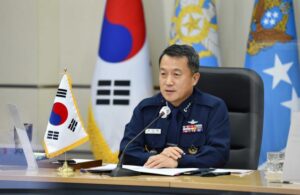 South Korea’s air force chief resigned Friday over the suicide of a woman master sergeant who was allegedly sexually assaulted by a colleague only to have her complaints ignored.
South Korea’s air force chief resigned Friday over the suicide of a woman master sergeant who was allegedly sexually assaulted by a colleague only to have her complaints ignored.
The incident has caused an outcry in the South, which maintains a conscript army to defend itself against the nuclear-armed North and remains deeply patriarchal despite its economic and technological advances.
The master sergeant, identified only by her surname Lee, is said to have been assaulted by her colleague in a vehicle in March, according to the defence ministry.
She filed a complaint, but her family says she was pressured by her superiors to drop the case and sign a settlement.
She was then transferred to a different base at her own request and found dead at her quarters late last month.
Her family says she left footage of her death on her phone, and her mother told a local broadcaster: “How can you protect a country when you can’t even protect a member of your own military?
“How could you make her feel this lonely? How could you make her feel there was no one there for her and she had to make such an extreme choice?”
By Friday afternoon around 350,000 people had signed a petition to the presidential office, calling for a thorough investigation.
A suspect in the case was arrested earlier this week and an investigation is continuing.
Air force chief general Lee Seong-yong offered his resignation Friday, which was quickly accepted by President Moon Jae-in.
“I feel heavy responsibility over the series of circumstances,” the general said.
“I express my deep condolences to the victim and extend sincere condolences to the bereaved family.”
The woman’s death comes amid growing discussion over whether the South’s all-male draft should be abolished.
All able-bodied male citizens have to serve for nearly two years but women can volunteer for the military.
Barrack-room bullying as well as other forms of abuse have long tainted South Korea’s military service and have resulted in several suicides and deadly shooting sprees in the past.
In March, a transgender South Korean soldier who was forcibly discharged from the army after gender-reassignment surgery took her own life, prompting another public outcry.
Meanwhile the South is regularly at the bottom of OECD rankings for the gender pay gap, and sexual harassment victims — the vast majority of them women — often face pressure to stay silent for fear of public shaming, stigma and career disadvantages.
“The military epitomises South Korea’s toxic masculinity, where violence is so often justified in the name of security,” women’s rights activist Kwon Soo-hyun told AFP.
“It’s the most patriarchal, hierarchical and exclusive community in the country. What we’ve seen in Lee’s case is that this masculinity kills people, both men and women.”

Global Markets Plunge As Trump’s Sweeping Tariffs Spark Recession Fears
Devastating 7.7 Magnitude Earthquake Rocks Southeast Asia, Killing Multiple People
Trump Announces Sweeping 25% Tariffs On Imported Cars And Parts
Sensitive US Military Plans Leaked In Stunning Security Breach